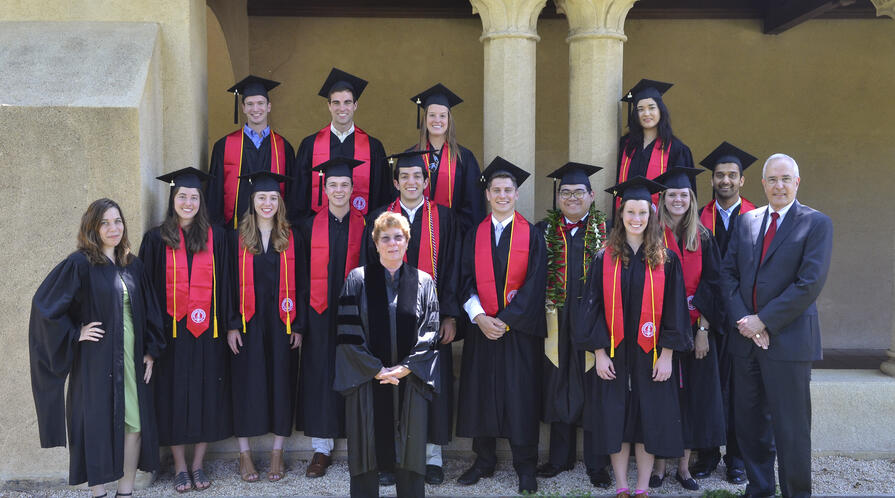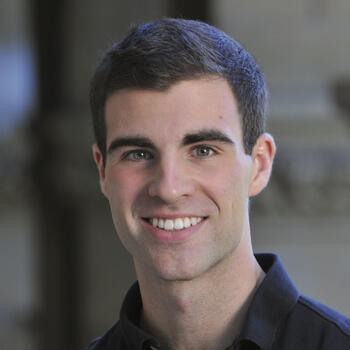CISAC Celebrates Honors Students' Prize-Winning Research
CISAC Celebrates Honors Students' Prize-Winning Research

CISAC's Honors Program in International Studies recently awarded three prizes to some of its students, instead of the traditional two. “At the end of the year we award prizes to three of the thesis writers. It’s always a hard decision to make because they are all really good,” said FSI Senior Fellow and Honors Co-director Martha Crenshaw.
Taylor Grossman, Patrick Cirenza, and Teo Lamiot were awarded the Firestone Medal for Excellence in Undergraduate Research, the William J. Perry Prize, and the John Holland Slusser World Peace Prize, respectively. They presented their work in front of faculty, advisors, and friends at a packed seminar in early June.
The Perry Prize, named after former Defense Secretary and current FSI Senior Fellow William Perry, is awarded to a student for excellence in policy-relevant research in international security studies. Cirenza’s thesis, “An Evaluation of the Analogy between Nuclear and Cyber Deterrence,” examined whether cyber weapons can be accurately understood by comparing them to nuclear weapons.

“My thesis topic definitely evolved over time,” Cirenza said. “I really did not know that much about cyber weapons. I initially wanted to look at non-state actors in cyber space and I asked Professor Scott Sagan about that and he asked what I knew about cyber and the reality was I really did not know anything. But I still really wanted to study it and at the time I was in Condoleezza Rice’s seminar and she suggested examining the analogy between nuclear and cyber weapons, which was being used a lot at the time. I went through several different topics and ultimately landed on deterrence.”
Cirenza was advised by FSI Senior Fellow Coit Blacker, who co-directs the honors program with Crenshaw, and by consulting professor Phil Taubman. Next fall he will attend Cambridge for a one year M.Phil program in international relations. After that he hopes to join the Marine Corps infantry.
“I never wanted a desk job in my twenties and I think it’s the best way to serve my country at this time,” he said.
The newly created Slusser Prize goes to the thesis that best contributes to the development of “permanent world peace.” Lamiot’s thesis, “When Blue Helmets Do Battle: Civilian Protection in the Democratic Republic of the Congo” examined whether the use of force against rebel groups in the DRC by UN peacekeepers had any effect on atrocities committed against civilians. He was advised by FSI Senior Fellow Stephen Stedman, who formerly served as Assistant Secretary-General and Special Advisor to the Secretary-General of the United Nations.
Lamiot started formulating his thesis topic when he was working in the U.S. embassy in the DRC. “I worked in the unit that is tasked with monitoring the conflict in the eastern part of the country. Part of my work was investigating a massacre that had taken place in that region about a month before I arrived in country. The massacre was of interest to the U.S. government because the Congolese and U.N. peacekeeping forces stationed nearby did not respond to the massacre despite knowing that it was going on,” he recounted.

“This sparked my interest and, at first, I wanted to answer the question why do peacekeepers use force in some cases but not in others, but I ultimately decided on answering what happens when they do use force. I’m hoping that my argument that in some cases using force has positive effects and decreases rebel violence against civilians informs these decision-makers on the ground when they are choosing what to do.”
After graduation Lamiot will be on a Center for Democracy, Development, and Rule of Law fellowship in Uganda doing development work. “I’ll likely be working on democratic and political development. I’m trying to learn something about how outside actors can try to bring about these development outcomes in foreign countries.”
The Firestone Medal is a Stanford-wide prize awarded to the top ten percent of all honors theses in social science, science, and engineering. Grossman, who will also graduate with a B.A. Political Science, wrote hers on homeland security and the evolution of terrorism advisory systems. She was advised by CISAC Co-Director Amy Zegart.
“I really wanted to look at effectiveness of communication and intelligence sharing, but in a way that I could actually see government information. That led me to public warning systems for terrorism where there is a lot of public information available. Not a lot has been written on how effective they are, how they operate, or how they have evolved,” Grossman said.

After graduation she plans on joining the Hoover Institution as a research assistant.
“I feel like I majored in CISAC. Ever since I took the class ‘The Face of Battle’ with Professor Scott Sagan and Colonel Joe Felter, I’ve been hooked on international security and the issues CISAC focuses on. I think the honors program has been the defining part of my undergraduate career. It was really rewarding and challenging and I’m glad I did it.”
Grossman and Cirenza were also elected to the Phi Beta Kappa Society in May 2015, as was Geo Saba, a political science major. Phi Beta Kappa is a nationwide society honoring students for the excellence and breadth of their undergraduate scholarly accomplishments.
Additionally, the Stanford Alumni Association (SAA) selected Cirenza, Grossman, and Akshai Baskaran, who majored in chemical engineering, to receive an Award of Excellence.
Congratulations to all graduates of the Class of 2015: Akshai Baskaran, Patrick Cirenza, Kelsey Dayton, Taylor Grossman, Sean Hiroshima, Annie Kapnick, Sarah Kunis, Teo Lamiot, Austin Lewis, Sam Rebo, Geo Saba, Eliza Thompson, and Adrienne von Schulthess.
